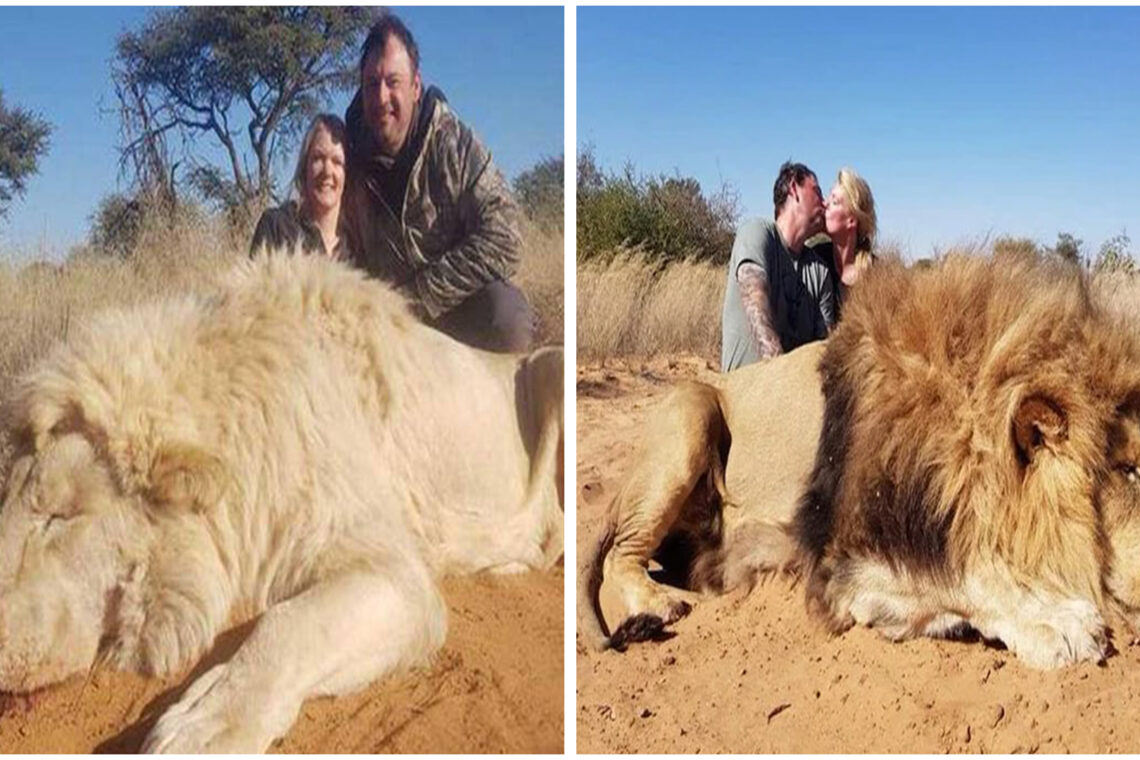
The practice of hunting animals for sport is a deeply contentious issue, especially among those who advocate for animal rights and welfare. Recently, a couple from Canada sparked outrage after they celebrated the killing of a lion with a photograph that showed them sharing a kiss over the slain animal. This image has circulated widely, igniting a wave of disgust and disbelief from animal lovers around the world.
Darren and Carolyn Carter, the couple in question, decided to commemorate their trophy kill in an appalling manner that many found disturbing. The photo, which was shared by Legelela Safaris—a hunting company based in South Africa—accompanied the image with the caption, “Hard work in the hot Kalahari sun… well done. A monster lion.” This wording raised eyebrows, as the idea of “hard work” associated with killing a captive animal with a firearm seemed contradictory to most people’s understanding of ethical hunting.
Legelela Safaris promotes itself as an organization that caters to hunters and non-hunters alike, even encouraging families to join in on their hunting expeditions. They offer luxurious packages for those wishing to participate in these activities, and their pricing structure reflects the exclusivity of these experiences. For example, while costs for hunting animals like hyenas are listed, inquiries for lion hunts are marked “price on request,” suggesting a high price tag that accompanies the act of taking down such a majestic creature.
The shocking image of the Carters celebrating their kill triggered an avalanche of responses, with many users taking to social media to voice their outrage. Dr. Lauren Gavaghan, among others, expressed her sentiments, declaring, “Not brave. Not cool. Cowardly to the extreme. What sad, sad souls to kill such a majestic and beautiful animal.” This tweet, like many others, encapsulated the feelings of many who believe that such actions reflect a deep-seated moral failing rather than any display of strength or bravery.
The couple, known for their taxidermy business named Solitude Taxidermy, has come under intense scrutiny for their actions. Reports indicated that they had killed three lions in a single day, a practice that many activists have labeled as “canned hunting.” This term refers to the practice of hunting animals that are kept in enclosures and are therefore unable to escape, a scenario that is viewed as highly unethical by animal welfare organizations. Critics argue that such practices undermine the very essence of hunting, reducing it to a mere display of power and privilege.
The kissing couple are Darren and Carolyn Carter from Alberta Canada, they killed 3 canned lions in a day. They run a taxidermy business called Solitude Taxidermy, on Facebook. 🤬🤢@rickygervais @CBTHunting @Protect_Wldlife @PeterEgan6 @_AnimalAdvocate @Animal_Watch @Animals1st pic.twitter.com/Z96aKcPrhL
— Xpose Trophy Hunting (@XposeTrophyHunt) July 15, 2019
Responses from the public varied, with many expressing disgust at the couple’s actions and the normalization of trophy hunting in general. A user named Oilergirl expressed her dismay, stating, “I am thoroughly disgusted and appalled at these people. This is all for sport, and it is absolutely disgusting. This has to stop now!” Such comments reflect a growing sentiment among activists that the practice of trophy hunting, especially of endangered or threatened species, needs to be critically examined and ultimately abolished.
The backlash against the Carters intensified to the point where they reportedly received multiple threats of violence. In light of the outrage, the couple made the decision to erase their social media presence, a move that underscores the level of vitriol directed at them. When approached by the press, Darren Carter refused to provide a comment, stating, “We aren’t interested in commenting on that at all. It’s too political.” His statement hints at a refusal to engage in the ethical discussions surrounding their actions, possibly to avoid further backlash or to downplay the serious implications of trophy hunting.

The ethical dilemma surrounding hunting for sport raises fundamental questions about human interaction with wildlife. What drives individuals to pay significant amounts of money to kill animals? This question is perplexing to many, who see such practices as barbaric and disconnected from a society that claims to value conservation and the preservation of biodiversity. The motivations behind trophy hunting often include a sense of adventure or the thrill of the hunt, but these reasons are increasingly scrutinized as society shifts toward greater respect for animal life.
The global conversation about trophy hunting is not new, but incidents like this serve to highlight the urgency of the issue. Activists argue that such practices contribute to the decline of species populations and disrupt ecosystems. The celebration of a kill, particularly of an iconic animal like a lion, perpetuates a culture that views wildlife as mere trophies rather than living beings deserving of protection and respect.
As public outrage continues to grow, it becomes clear that there is a pressing need for re-evaluation of how society views hunting and wildlife conservation. Calls for stricter regulations on hunting practices are becoming louder, emphasizing the need to prioritize ethical treatment of animals over the desires of a select few. There is a growing recognition that the lives of these animals are invaluable and that their preservation is critical to maintaining ecological balance.
The story of the Carters and their disturbing celebration of a lion kill serves as a reminder of the stark divide that exists in perceptions of wildlife and hunting. It calls into question not only the ethics of hunting for sport but also the broader values we hold regarding our relationship with the natural world. As we continue to grapple with these issues, it is imperative that we advocate for the rights and lives of animals and work towards a more compassionate approach to our interactions with wildlife.